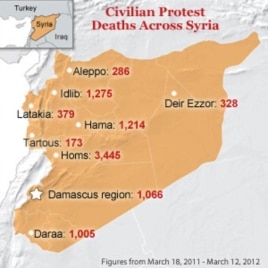With the most recent killing of innocent civilians in Syria, a debate is reemerging about the proper role of the US & UN in the conflict. Gideon Rachman from the Financial Times argues for continuing diplomatic efforts, while Syrian protesters in the diaspora are calling for US military intervention. To complicate matters, Iran has just admitted to having an increased military presence in Syria to assist Assad. Will this serve as a justification for Turkey, Saudi Arabia, or the US to do the same?
Here's a video on the most recent killings in Houla, Syria.
The diplomacy front is the status quo at this point, so I won't go into it. How should we thus understand calls for intervention? Let's look at other instances over the last couple of decades. A piece from a couple of months ago in Huffpo by Ruwaydah Mustafa demonstrates the importance of looking at any social issue from the margins for unforeseen insights and unsettling critiques. In memory of the 1988 massacre of Kurds in Halabja on Saddam Hussein's orders, she wrote: Here's a clip from the remnants of what was Halabja:
Here's a video on the most recent killings in Houla, Syria.
The diplomacy front is the status quo at this point, so I won't go into it. How should we thus understand calls for intervention? Let's look at other instances over the last couple of decades. A piece from a couple of months ago in Huffpo by Ruwaydah Mustafa demonstrates the importance of looking at any social issue from the margins for unforeseen insights and unsettling critiques. In memory of the 1988 massacre of Kurds in Halabja on Saddam Hussein's orders, she wrote: Here's a clip from the remnants of what was Halabja:
Nonetheless, numbers do not account for everything, but contextual comparisons can be instructive. Moreover, the Halabja massacre was on an equal footing to the Srebrenica mass killing of 1995 that prompted a more robust response by the UN, NATO, and the US to restrain Serbia and bring an end to the conflict and killing of Bosnians.
Back to Syria. According to the Voice of America: "U.N. officials estimate that 8,000 people have died in the year-long series of protests and government crackdown." The conflict is already in the death toll range of Palestinians (not per capita, though), and is way above what led to NATO military air raids in Libya to oust Qaddafi. A case can be made either way and either way there will be a massive killing "purge" following any alleged resolution to the conflict.
To be a bit cynical, I don't think Obama wants to begin military actions during a presidential campaign, although it could be in the cards if polling doesn't look favorable, or if international pressure significantly mounts so that he can arrange a genuine coalition. I also think he knows that he probably would not be able to get away with the drawn out plan (mis-)applied in Libya. And, Iran and Russia will make sure that Syria will not fall nearly as easily. Ultimately, it's a matter of if the phrase "never again" is applied and then supercedes strategic thinking or not.
